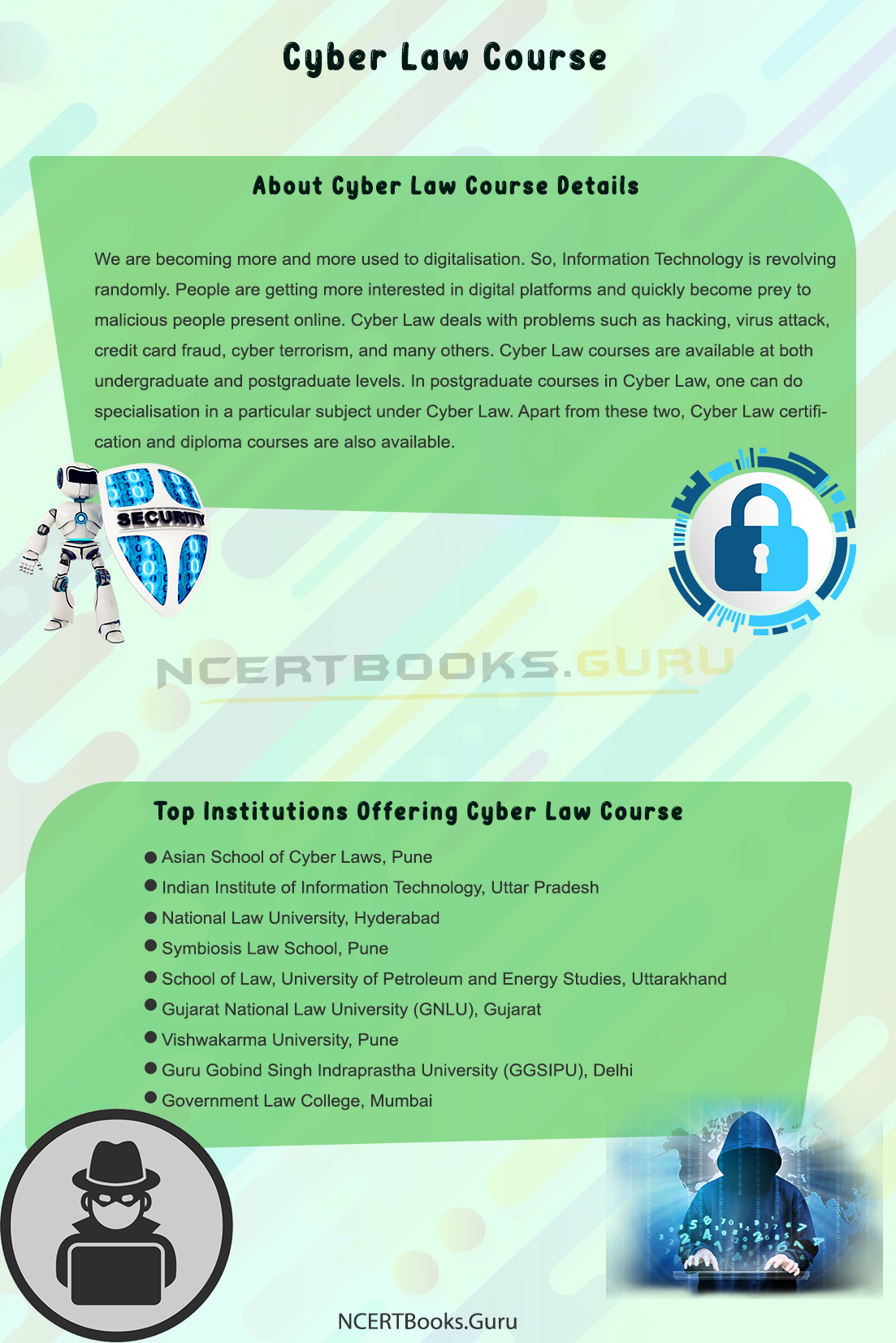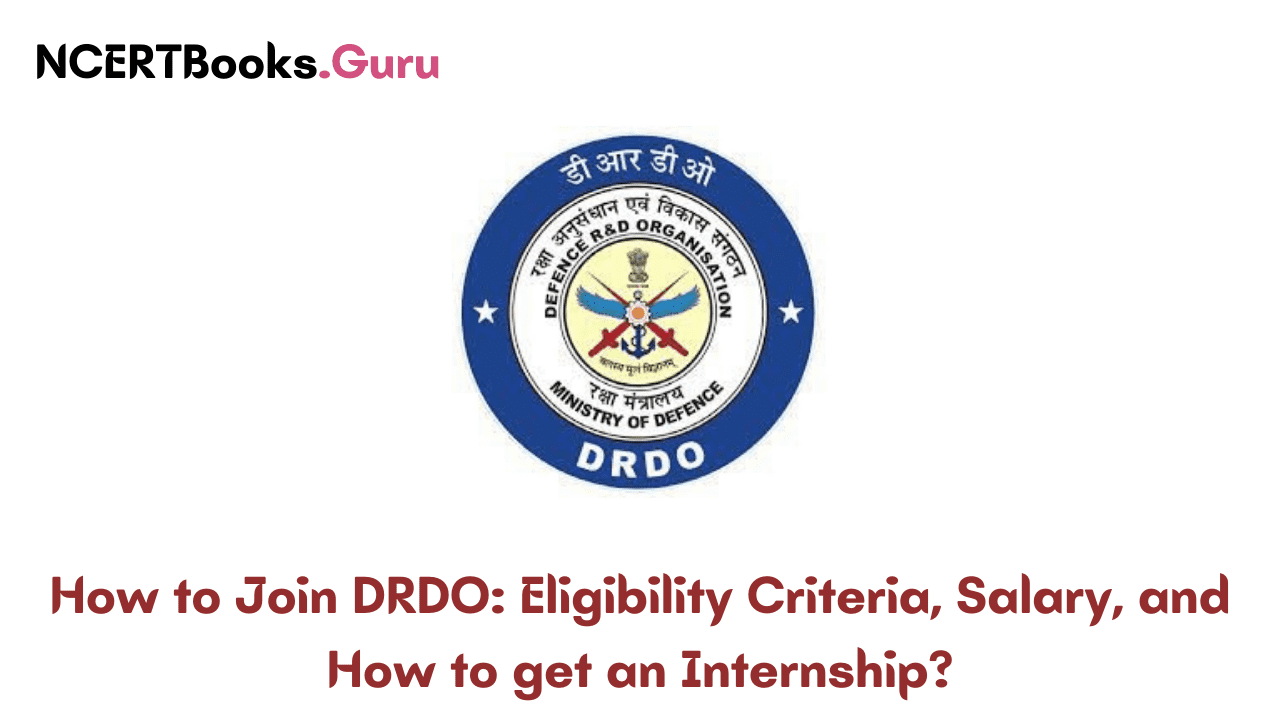Cyber Law Course: Cyber Law is the part of the legal process that deals with the issues of the world wide web. Cyber Law is called the Law of the Internet. It deals with topics such as online privacy, access and usage of the internet, freedom of speech, and many other factors. Cyber Law protects people and organisations from criminals on the internet. Candidates willing to pursue a course on Cyber Law have to protect people and organisations from digital theft, fraud, forgery, and defamation. If someone wants to do a postgraduate course in Cyber Law, s/he can choose a specialisation subject.
Cyber Law is there to maintain law and order in digital platforms. Digital policies are also part of Cyber Law. One must know about the Cyber Law for a particular online activity before doing it to stay safe. In this course, complete information on Cyber Law courses is provided.
Get to Know More about other types of Course Details in Stream wise, and Category wise.
About Cyber Law Course Details
We are becoming more and more used to digitalisation. So, Information Technology is revolving randomly. People are getting more interested in digital platforms and quickly become prey to malicious people present online. Cyber Law deals with problems such as hacking, virus attack, credit card fraud, cyber terrorism, and many others. Cyber Law courses are available at both undergraduate and postgraduate levels. In postgraduate courses in Cyber Law, one can do specialisation in a particular subject under Cyber Law. Apart from these two, Cyber Law certification and diploma courses are also available.
Cyber Law Course Details
| Course level |
Undergraduate/ Postgraduate/ PG Diploma/PG Certification |
| Duration |
Undergraduate- 3 years
Postgraduate- 2 years
PG Diploma- 2 years
PG Certification- 6 months to 1 year |
| Eligibility |
Undergraduate- 10+2
Postgraduate- bachelor’s degree
PG Diploma- bachelor’s degree
PG Certification- bachelor’s degree |
| Admission process |
Entrance Exam/ last examination’s marks |
| Course Fee |
50000 rupees to 20 lakhs rupees |
| Average salary |
Approximately 3 to 8 lakhs per annum |
| Top Recruiters |
Trilegal, Nishith Desai, Associates, Ministry of IT, Government of India, Cyril AmarchandMangaldas, Kochhar & Co, AZB & Partners, and Deloitte. |
| Job Positions |
Cyber Lawyer, Legal Advisor, Legal Consultant, Cyber Assistant, Cyber Consultant, Cyber Law Lecturer, Research Assistant, and Security Auditor. |
Skillset Required for Cyber Law Course
Candidates willing to pursue a Cyber Law course must have good knowledge of technology as Cyber Law is related to technology. One must have a basic understanding of the Indian Penal Code. A sharp mind is required as Cyber Law professionals need to research, analyse, and find out the cause of different illegal issues on the internet. Some of the prerequisites that one should have to do a course in Cyber Law are given below:
- Detail-oriented
- Research skills
- Observation skills
- Presentation skills
- Clarity of speech
- Clarity of thought
- Integrity
- Intellectualism
Cyber Law Course Duration
There are different kinds of Cyber Law courses available. One will get the duration of different types of Cyber Law courses in the below-mentioned chart.
| Duration |
Undergraduate- 3 years
Postgraduate- 2 years
PG Diploma- 2 years
PG Certification- 6 months to 1 year |
Cyber Law Course Eligibility Criteria
The eligibility criteria vary from institution to institution. Every institution has its eligibility criteria for providing admission. Some of the standard eligibility criteria are discussed below:
- For undergraduate programs in Cyber Law: one must pass class 12 from a recognised board. The minimum marks required for admission vary from 45 percent to 60 percent.
- For postgraduate programs in Cyber Law: one must complete graduation from a recognised university with a minimum of 50 percent marks in aggregate. After completing three years of diploma courses, candidates can also apply for this program. Candidates in the last year of graduation program awaiting the final year’s result can also apply for this program. However, admission will be granted after submitting the final year’s result.
Cyber Law Course Admission Procedure
Most of the colleges offer Cyber Law course based on an entrance examination. A few colleges also provide admission based on the merit obtained in the previous examination. Some colleges arrange for counselling and personal interview before confirming admission. One should check his/her preferred college’s verified website for admission details to be fully assured.
Entrance-Based Admission Procedure
Most of the colleges prefer entrance examination as admission procedure in Cyber Law courses. There are a good number of entrance examinations for Cyber Law courses. A few entrance examinations are discussed below:
- CLAT: It is a national-level entrance examination for admission in undergraduate and postgraduate law courses. The Consortium of National Law Universities conducts this examination. It happens once a year. This is an online examination of 120 minutes. It checks candidates’ aptitude and reasoning abilities.
- AILET: It is a national-level entrance examination for admission in five years B.A LL.B program. National Law University, Delhi conduct this examination. It happens once a year. AILET is an online examination of 90 minutes. It checks candidates’ verbal ability, mathematics, aptitude, general awareness, and reasoning abilities.
- LSAT India: Law School Admission Test ( LSAT ) is a national-level entrance examination for admission in undergraduate and postgraduate law courses. It happens once a year. This is an offline examination of 2 hours 20 minutes. It checks candidates’ logical reasoning, comprehension skills, and analytical reasoning.
- AIBE: AIBE is a national-level entrance examination. The Bar Council of India conducts this examination. It happens twice a year. This is an offline examination of 3 hours 30 minutes.
Merit-based Admission Procedure: A few colleges provide direct admission based on the merit obtained in the last examination. The minimum marks required for admission vary from 45 percent to 60 percent.
Cyber Law Course Fee Structure
The course fee of Cyber Law varies from 50000 rupees to 20 lakhs rupees. The course fee depends on the reputation and location of the college. Government colleges offer Cyber Law courses at a lower price than private colleges.
Cyber Law Course Syllabus
The syllabus of different Cyber Law courses is mentioned in the chart below. However, the actual syllabus of a particular college may slightly differ from this.
Undergraduate Syllabus B.Tech in Computer Science/ Engineering/ LLB (Hons) in Cyber Laws:
| Physics I & Chemistry |
Basic Electronic Engineering |
| Environmental Studies |
Legal History of Courts |
| Data Warehousing and Data Mining |
Mobile Computing |
| Theory of Automata & Computation |
IT for Forensic Science |
| Data Structures using ‘C’ |
Compiler Design & Web Technologies using NET |
| Digital Crime & Computer Law |
Network Security & Cryptography & Family Law II |
| Database Management System & Law of Contracts I |
Arbitration & Conc & & Alternative Dispute Res Mech |
| Legal Method + Legal Reasoning |
Basic Electronic Engineering |
| Storage Techn Foundations & Constitutional Law I |
Drafting, Pleading & Conveyance |
| Law of Contracts II & Family Law I |
Internet Regulation & Jurisdiction |
| Meditation Workshop |
Mobile Computing |
| Taxation Law & Private International Law |
Dig Copyright & Data Prot. Law & Jurisprudence |
| International Trade Law |
Law of Telecommunication convergence |
| Moot Court & Internship & Dissertation II |
Physics II & Mathematics II |
| Artificial Neutral Networks |
Information Security Audit & Monitoring |
Cyber Law Postgraduate Syllabus Master of Cyber Law
| Data or Information Cryptography |
Intellectual Property Issues |
| Computer Forensics & Digital Evidences |
Internet Architecture & Network Security |
| E-Commerce Legal Issues |
Cyber Crime Laws in India |
Cyber Law Postgraduate Syllabus LLM in Cyber Law
| Cyber Contract and IT Act 2000 |
Regulation of cyber crimes |
| IPR – An overview |
Copyright issue in cyberspace |
| Cyberlaw in India |
Software Development & Licensing Agreements |
| Overview of cyber law |
Cyber-crimes and related concepts |
Cyber Law Postgraduate Syllabus Master of Cyber Law & IT
| Introduction to Computer Technology and Programming |
Security Audit |
| Identity and Access Management |
Fundamentals of Information Security |
| e-Business Security |
Computer Forensics and Digital Evidence |
| OS: Linux, Server (Apache) |
Legal Dimensions of IPR in Cyber World |
| IT Acts and Cyber Crime |
Identity and Access Management |
| Data Information |
Internet Architecture and Network Security/ Networking & Network Security |
Cyber Law Diploma Syllabus
| Introduction to Cyber Law |
Data Privacy & Confidentiality |
| Electronic & Digital Signatures – Legal Issues |
Judicial Framework |
| International Framework |
Computer Databases & Law |
| Semiconductor Layout & Design Law |
Information & Traffic Data |
| Legislative Framework |
Basic legal terms and concepts |
| Computer Source Code |
Quasi-Judicial Framework |
| Freedom of Speech |
Electronic Contracts |
| Investigative Framework |
Understanding Computer Software |
| Introduction to Cyber Law |
Cyber Pornography |
| Cyber Security |
Cyber Terrorism |
| Unauthorised Access |
Digital Signatures – Technical Issues |
| Electronic & Digital Signatures – Legal Issues |
Violation of Privacy |
Cyber Law Post Diploma Syllabus
| Introduction to the Cyber World and Cyber Law |
Security of information |
| Types of E-commerce |
International Legal Regime |
| The internet and online resources |
Essential Issues in Global E-commerce |
| Cyberlaw in India with particular reference to the Information Technology Act, 2000 |
Cyber World |
| Online business |
Regulation of cyber crimes |
| Digital signature |
An overview of Cyber Law |
| Application of conventional territory based law to E-commerce |
IPR Issues |
| Introduction about the cyberspace |
IPR – An Overview |
| Cybercrime and Related Concepts |
Regulation of cyberspace – introducing cyber law |
| Trademark Issues in cyberspace |
Copyright Issues in Cyberspace |
| Paper IV: E-Commerce |
Computer Software and Related IPR Issues |
Cyber Law Certificate Courses Syllabus
| Cyber Crimes, Privacy & Data Security |
Cyberspace Technology and Social Issues |
| Commerce and Cyberspace |
Technology Outsourcing |
| Regulation of Cyberspace |
Software-As-A-Service & Licensing |
| Online Reputation Management |
Electronics Contract and Digital Signature |
| Introduction to IT Law |
Privacy and Data Protection |
Top Institutions Offering Cyber Law Course
There are multiple numbers of institutions in India offering Cyber Law courses. Some of them are listed below:
- Asian School of Cyber Laws, Pune
- Indian Institute of Information Technology, Uttar Pradesh
- National Law University, Hyderabad
- Symbiosis Law School, Pune
- School of Law, University of Petroleum and Energy Studies, Uttarakhand
- Gujarat National Law University (GNLU), Gujarat
- Vishwakarma University, Pune
- Guru Gobind Singh Indraprastha University (GGSIPU), Delhi
- Government Law College, Mumbai
- The National University of Advanced Legal Studies (NUALS), Kerala
Career Prospects of Cyber Law
Nowadays, digital crimes are increasing. As a result, Cyber Law has become an essential part of the legal system. There are many job opportunities in the field of Cyber Law. Different organisations hire Cyber Lawyers for their legal service and advice. There is a massive demand for Cyber Law experts in Information Technology as well.
Employment Areas
After completing the Cyber Law course, one can have a wide range of job opportunities in different sectors. Some of the industries that hire Cyber Law experts are listed below:
- Law Enforcement Agencies
- IT Firms
- IT Consultancies
- Banking and Financial Firms
- E-commerce Firms
- College and Universities

Job Profiles Under Cyber Law
The Information Technology sector, police department, legal department, various kinds of public and private organisations hire Cyber Law experts. Some of the job positions that Cyber Law experts are offered are listed below:
- Cyber Lawyer
- Legal Advisor
- Legal Consultant
- Cyber Assistant
- Cyber Consultant
- Cyber Law Lecturer
- Research Assistant
- Security Auditor
Top Recruiters for Cyber Law
Some of the top-level recruiters of Cyber Law experts are listed below:
- Trilegal
- Nishith Desai Associates
- Ministry of IT, Government of India
- Cyril AmarchandMangaldas
- Kochhar & Co
- AZB & Partners
- Deloitte
Salary Prospects Under Cyber Law
Cyber Law expertise has become one of the demanding skills worldwide. In India, Cyber Law experts are provided handsome salary packages. However, it depends on the job position, location, and reputation of the organisation. A fresher in Cyber Law earns an average of 3 to 4.5 lakhs rupees per annum. A mid-level expert makes an average of 6 to 8.5 lakhs rupees per annum. An expert in Cyber Law can earn up to 48 lakhs rupees per annum in India.
FAQ’s on Cyber Law Course
Question 1.
What are the top recruiters that hire Cyber Law experts?
Answer:
Some of the top-level recruiters that hire Cyber Law experts are Trilegal, Nishith Desai, Associates, Ministry of IT, Government of India, Cyril AmarchandMangaldas, Kochhar & Co, AZB & Partners, and Deloitte.
Question 2.
Is Cyber Law a right career choice?
Answer:
Yes, it is indeed. The demand for Cyber Law experts is increasing day by day. Cyber Law experts are offered good salary packages. Apart from this, they also get emotional satisfaction by stopping crimes.
Question 3.
Can I do a course on Cyber Law after completing class 12?
Answer:
Yes, you can do an undergraduate degree course in Cyber Law after completing class 12 from a recognised board.
Question 4.
Can students from a science background do the Cyber Law course?
Answer:
Yes, students from any stream can do the Cyber Law course. Some institutes prefer a minimum of 50 per cent marks in aggregate in the last examination.
Question 5.
Can I do a specialisation in Cyber Law?
Answer:
You can do specialisation in a particular subject of Cyber Law at the postgraduate level.











